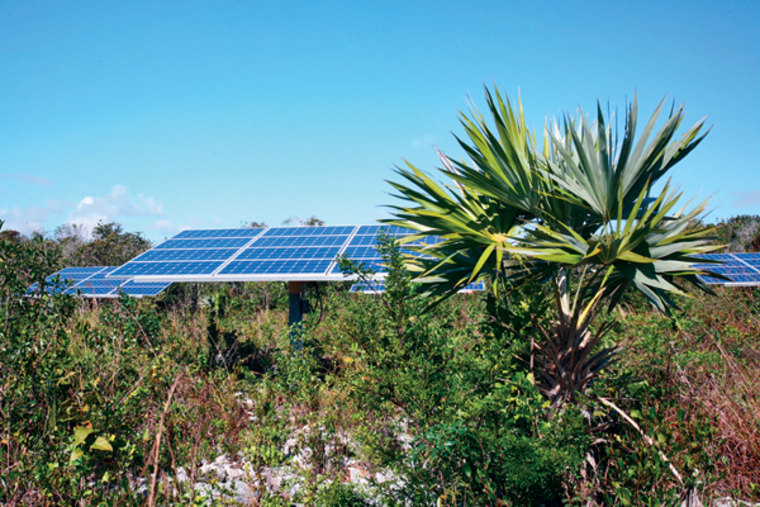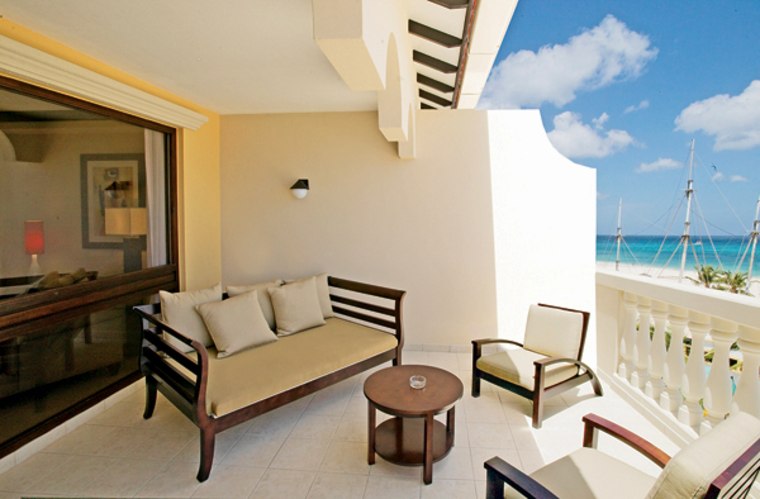As passionate lovers of the Caribbean, we appreciate all the things that make it … well … the Caribbean: crystal-clear water, reefs teeming with sea life and unspoiled miles of sugary sand. But, of course, tourism can have a ruinous effect on those very conditions, and so can global warming. The region is experiencing more hot days, fewer cool nights and more-frequent and longer droughts, says Dr. Ulric Trotz of the Caribbean Community Climate Change Centre in Belize. Furthermore, he says, rising sea levels are leading to coastal erosion and flooding, and warmer sea temperatures are making the water inhospitable to local sea life.
Sustainable tourism, like eco-tourism, is an umbrella term for environmentally and socially sensitive practices that are key to preserving the natural assets of the Caribbean.
What is sustainable tourism?
“Limiting our impact on the environment so that the land, the beach and the reefs look the same 50 years from now as they do today,” says Peter Hillenbrand, an active environmentalist and owner of the Little Cayman fish and dive resort, the Southern Cross Club. Sustainable tourism also embraces strategies and techniques that minimize the negative social consequences of tourism, while promoting its positive effects.
What is the Caribbean tourism industry doing to encourage sustainable-tourism practices?
Sustainable-tourism interests in the region seek to reduce the causes of global warming; to limit waste and conserve energy; to responsibly manage natural resources, such as land and water; and to contribute to community development through employment and community relations. Ten years ago the Caribbean Hotel Association established an environmental nonprofit, the Puerto Rico-based Caribbean Alliance for Sustainable Tourism (CAST), to work toward these goals. A critical part of CAST’s mission is management of the hotel-certification process through Green Globe, a worldwide benchmarking program for the tourism industry. Green Globe member hotels voluntarily implement and document an ecology-friendly environmental management and training program. Compliance is continuously monitored by Green Globe’s team of independent inspectors. With 57 certified properties, the Caribbean has more accredited hotels than any other region in the world.
How can I find a hotel that uses environmentally and socially sensitive practices?
A good place to start is at the Web sites of CAST and Green Globe, both of which have an island-by-island listing of Green Globe-certified resorts. However, CAST director Deidre Shurland advises travelers that certification is voluntary. “Green Globe certification tells consumers that hotels are really doing what they say they are, but it’s a misconception to think that only certified hotels have responsible environmental practices,” she says.
How are Caribbean hotels putting sustainable principles into practice?
Hotels of every size are responding with meaningful measures. Small hotels like Tiamo on South Andros and Dominica’s 3 Rivers Eco-Lodge follow a strictly sustainable model. Dominica’s newest eco-resort, Jungle Bay, is powered by hydroelectricity, recruits and trains staff from the surrounding area and offers micro-loans to local entrepreneurs. The eco-chic Hotel Mocking Bird Hill in Port Antonio, Jamaica, offers a honeymoon package that offsets a couple’s carbon footprint with a donation to the Jamaica Conservation Development Trust, which plants trees to slow local deforestation. Other guests of the 10-room inn are invited to donate between $10 and $30 to the JCDT.

Midsize hotels have also gotten with the program. Guest rooms at Aruba’s 71-room Bucuti Beach Resort feature energy-saving bulbs; water-efficient shower heads, faucets and toilets; locally made toiletries; laundry bags made from recycled sheets; and air conditioners that shut off automatically when doors are opened.
“We attract people who understand our mission and realize that you can still enjoy a comfortable and happy vacation without damaging the environment,” says Karl Pilstil, owner of Tobago’s 55-room Blue Haven hotel. The Bacolet Bay resort won the Caribbean Tourism Organization’s Sustainable Tourism Award last year and favors a multifaceted approach: It has successfully implemented an ecology-friendly water-purification system, uses solar energy to heat water and has constructed a “flying roof” that shields the main building from the sun, thereby slashing cooling costs. Though the hotel isn’t Green Globe-certified, its efforts have proven its commitment to sustainability, reducing energy consumption to roughly a third less than that of a comparable conventional hotel.
In 1998, Sandals Negril in Jamaica was the first Caribbean all-inclusive to receive Green Globe certification, and now all 16 Sandals and Beaches resorts are similarly certified. Environmental managers at each property oversee energy and water conservation, waste-disposal and marine-management programs. “Our staff is keenly aware that there is a very delicate link between man, tourism and the environment,” says the company’s chairman and founder, Gordon “Butch” Stewart.
How else can I travel responsibly?
When you book your airline ticket, consider purchasing a “carbon offset” to compensate for the greenhouse-gas emissions of your flight. Late last year, Delta Airlines began offering passengers the option of donating $11 per international flight to The Conservation Fund (conservationfund.org) to be used for tree-planting in the U.S. and overseas. Entities such as Sustainable Travel International (STI) will invest an offset donation in large-scale tree-planting and energy-conservation programs and in funding sources of renewable energy. Divers with Grand Cayman operator Ocean Frontiers can calculate the emissions from their flights and dives and purchase an offset through STI.When you cruise the buffet line, pile on the local fruit and vegetables; you’ll be supporting local growers and reducing the environmental cost of importation. Make responsible seafood choices by avoiding items from overfished areas or those farmed in ways that harm the environment or other marine life. The Cayman Sea Sense program offers a seafood guide that’s useful throughout the region, available online here. Beginning this month, guests at Grenada’s Paradise Bay resort can book a “volunteer vacation” of no fewer than three weeks by contributing four hours’ daily work on the hotel’s community and energy-conservation projects. Guests pay a service charge and the cost of their meals, but accommodation is free. Shop for locally crafted souvenirs. You’ll be directly supporting the economy of the community, and you’ll enjoy a richer and more authentic vacation experience.
Sustainable sites
In addition to those mentioned previously, these outfits and their Web sites are useful to the ecology-minded traveler.
Sustainable Travel International provides a guide to carbon offsets plus a directory of green travel-and-tourism providers at carbonoffsets.org. Orbitz has an eco-travel microsite, eco.orbitz.com, where you can buy carbon offsets or find a hotel. Responsibletravel.com is a U.K.-based site where you can book a vacation or browse consumer reviews and an international directory of providers. Travelocity makes it easy to find volunteer vacations in a variety of locales, including Cuba and Costa Rica, at travelocity.com/travelforgood.
is the magazine for anyone in search of the perfect tropical getaway. Each issue presents expert insider’s advice on where to find the Caribbean’s best beaches and attractions, its finest resorts and spas, liveliest beach bars and activities, and its friendliest people.
